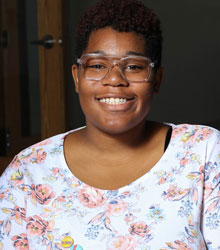Jasmine Maddox, ’20, Wins National Disability Advocacy Award
May 8, 2019
By Jake Weber

Jasmine Maddox is majoring in education policy with a minor in ethnic studies and a concentration in the Gerald R. Ford Institute for Leadership in Public Policy and Service. She is a graduate of KIPP Atlanta Collegiate High School in Georgia.
For even the most gifted students, being in college is hard work. For students who are in college and struggling with physical or mental health challenges, college is that much harder. Being in college, struggling with a disability and advocating for a change in campus climate—that combination seems just about impossible.
Until you meet Jasmine Maddox, ’20. During the just concluded spring semester, Maddox was one of two undergraduates nationwide to receive a 2019 Association on Higher Education and Disability (AHEAD) Scholarship. The award recognizes Maddox’s work as a disability advocate on Albion’s campus, and provides support for her final year of college.
“I couldn’t believe it when I got the letter. I had to ask my boss, [Learning Support Center Assistant Director] Elizabeth Rudolph, ‘Is this real?'” Maddox recalls. “She said, ‘Yes, it’s real.’ I said, ‘I don’t think it’s real.’”
Maddox, who struggles with the “invisible” effects of post-traumatic stress disorder, attention deficit-hyperactivity disorder, anxiety and depression, says her first year of college was almost her last.
“When I started college, I thought I had to be perfect. I had a lot of anxiety about what other people thought about me, and about whether I could keep up in my classes,” she says. “It wasn’t until I got to Albion that I realized I had major issues I had to work through.”
Luckily, it didn’t take Maddox long to find support from Albion’s Counseling Services office; she also put together an informal network of supportive faculty and staff. With their help, Maddox began focusing on self-care, self-acceptance and strategies for coping with anxiety- and sleep-related issues. These problems haven’t gone away, but Maddox now has resources and a better understanding of how to manage her mental health.
She also began to recognize that there were others—many others—around her who needed similar help. “My auntie always told me, ‘Closed mouths don’t get fed,'” Maddox says, explaining how her work as an advocate started. “I did not see myself on the College’s website, nor was there representation reflected in the school’s administration. When no one is here to advocate for students of color, I decided I had to do it for myself.”
Learning Support Center Director Pam Schwartz nominated Maddox for the award and “I completed the application in one day,” says Maddox. “Disability advocacy is something I have always been passionate about, Being here, advocating at Albion, inspires me to change the world.”
Maddox joined the Student Senate, voicing issues related to accessibility and inclusion. An early effort she accomplished was placing menstrual trash cans in all women’s shared bathrooms. “I’ve had people tell me thanks because they were too embarrassed to say something,” she notes.
This spring, Maddox organized the visit of collegiate disability-rights activist Keri Gray to Albion. Last summer, she attended a national conference where many of the nation’s biggest companies shared their strategies for hiring a diversely abled workforce. She also works as a tutor and mentor in the Learning Support Center.
Maddox even designed her own major, in education policy, with the goal of someday working for a state department of education, where she can help ensure equity and accessibility for all children. “In five years, my goal is to be on a school board somewhere,” she says.
As the Student Senate’s “disability advocate” and with other activities on campus, Maddox has become comfortable talking about her mental health challenges, a subject that has historically been taboo for African-American women, she says. She doesn’t necessarily like to do it—but she recognizes the importance of not hiding who she is.
“It’s important to talk about Invisible disabilities because there are so many students and people who struggle with learning disabilities and mental health challenges all around us,” she says. “They are in our friend groups and they may even be our professors.
“If we normalize the conversation about invisible disabilities, we can start to address the microaggressions and have conversations about different tools for accessibility needed for people with invisible disabilities,” Maddox continues. “There are so many students who want to talk about their struggles and create a space where they can address disability and not just hide it. We exist and we are here.”
This summer, Maddox will spend seven weeks in Boston teaching middle school history as an Uncommon Schools Teaching Fellow.
Jasmine Maddox is a rising senior majoring in education policy with a minor in ethnic studies and a concentration in the Gerald R. Ford Institute for Leadership in Public Policy and Service. She is a graduate of KIPP Atlanta Collegiate High School in Georgia.